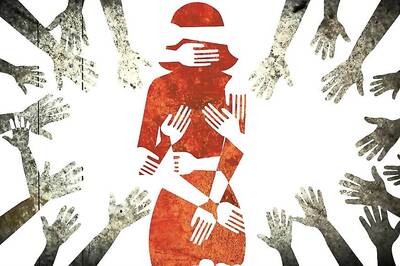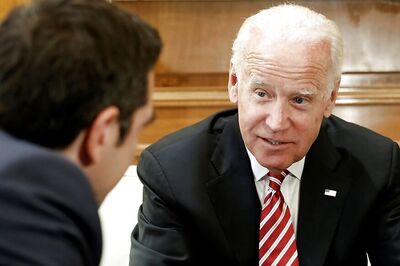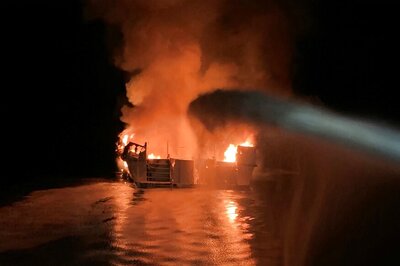
views
The conflict between Israel and Hamas entered its eleventh day on Tuesday as Israel continued its retaliatory air strikes in the Gaza Strip and overnight strikes on Hezbollah targets in Lebanon. More than one million people have been displaced inside the densely populated Palestinian territory as Israel prepares for a full-blown ground offensive against Hamas.
The war that began October 7 has become the deadliest of five Gaza wars for both sides, with more than 4,000 dead. Israel declared war on Hamas after the Islamist group’s militants broke through the heavily fortified border and shot, stabbed and burned to death more than 1,400 people, mostly civilians.
Israel has responded with relentless bombing, killing around 2,750 Palestinians, in the impoverished Gaza Strip. The deadliest clash is one of the many intense fighting between Hamas which controls the Gaza Strip and Israel.
Here is a history and timeline of the Israel-Palestine conflict.
Creation of Israel
The root of the creation of Israel was the Balfour Declaration of 1917, where the United Kingdom which captured Palestine from the Ottomans in World War I, declared its support for the establishment of a “national home for the Jewish people” in Palestine.
The Israeli-Palestinian conflict started in the second half of the nineteenth century when the United Nations adopted Resolution 181 in 1947. According to the plan, the territory was divided into Arab and Jewish states by the UK.
Israel was created on May 14, 1948, sparking the first Arab-Israeli War. The war ended in 1949 with Israel’s victory, but 750,000 Palestinians were displaced. The Palestine Liberation Organisation (PLO) was then created in 1964.

After the war, Israel also gained some territory which was formerly granted to Palestinian Arabs under the UN resolution. The erstwhile Palestine territory was divided into 3 parts: the State of Israel, the West Bank (of the Jordan River), and the Gaza Strip. Over the years, tensions rose in the region between Israel and Egypt, Jordan, and Syria.
Israeli-Arab war
In June 1967, Israel attacked Egyptian and Syrian air forces starting the Six-Day War. It managed to capture Sinai Peninsula, Gaza Strip, West Bank, Old City of Jerusalem, and Golan Heights. Jewish settlement of the occupied territories starts shortly afterwards and continues in the West Bank, east Jerusalem and the Golan Heights today.
Six years later, Egypt and Syria launched a surprise two-front attack on Israel in 1973 to regain their lost territory. The fresh offensive didn’t benefit either Israel or Egypt and Syria. Though Israel didn’t give up the territorial gains, it returned Sinai to Egypt in 1982.
Camp David Accords
In 1979, there was a series of cease-fires and peace negotiations during which the representatives from Egypt and Israel signed the Camp David Accords, a peace treaty that ended the three decades of conflict between Egypt and Israel.
Though the treaty improved relations between Israel and its neighbours, the question of Palestinian self-determination remained unresolved. In 1982, Israel invaded civil war-wracked Lebanon to attack Palestinian militants after initially sending in its forces in 1978.
Israeli-backed Lebanese militias kill hundreds of Palestinians in refugee camps in Beirut. Israeli troops remained in southern Lebanon until 2000.
First Intifada
In 1987, in what is known as the first intifada, or the Palestinian uprising against Israeli rule, hundreds of thousands of Palestinians living in the West Bank and Gaza Strip rose up against the Israeli government.
During the first intifada, which lasted till 1993, Hamas, an acronym for Harakat al-Muqawama al-Islamiya was launched by Palestinian cleric Sheikh Ahmed Yassin as a part of the Muslim Brotherhood, a transnational Sunni Islamist organisation.
In 1993, Palestinian leader Yasir Arafat signed the Oslo Accords with Israel to negotiate an end to the conflict based on a two-state solution. Arafat returned to Palestinian territories in July 1994 after 27 years living in exile to set up the Palestinian Authority. Self-rule is established for the first time in the Gaza Strip. However, Hamas opposed the deal and launched a series of suicide bombings in Israel.
Second Intifada
In 2000, Palestinians launched the second intifada over Israel’s control over the West Bank and former Israeli Prime Minister Ariel Sharon’s visit to the al-Aqsa mosque compound in east Jerusalem, the third holiest site in Islam and also holy to Jews, in September 2000. The second intifada lasted until 2005.
Responding to a wave of suicide bombings, Israel in 2002 invaded the West Bank in its largest operation there since the 1967 war.
US Revives Peace Process
The United States attempted to revive the peace process between the Israeli government and the Palestinian Authority in the West Bank in 2013. However, the peace talks were disrupted as Fatah, the Palestinian ruling party formed a unity government with rival faction Hamas in 2014.
2014 Conflict
In 2014, there was a military confrontation between the Israeli military and Hamas. Israel also launched a new operation against Gaza in an attempt to stop rocket fire and destroy tunnels from the Palestinian territory.

Hamas fired nearly three thousand rockets at Israel while the latter retaliated with a major offensive in Gaza. The clash ended in late August 2014 with a ceasefire deal brokered by Egypt. The conflict resulted in the death of 2,251 Palestinians and 73 Israelis.
Trump recognises Jerusalem
On December 6, 2017, then-US President Donald Trump recognised Jerusalem as the capital of Israel, a decision that outrages Palestinians and sparked international criticism. Abbas says the US can no longer play its historic role as a mediator of peace talks with the Israelis.
11-day war in 2021
In 2021, the Israeli police raided Al-Aqsa Mosque in Jerusalem which sparked an 11-day war between Israel and Hamas killing more than 200 Palestinians and more than 10 Israelis.
Recent clashes
Aug 2022: At least 44 people, including 15 children, are killed in three days of violence that began when Israeli air strikes hit a senior Islamic Jihad commander.
Jan 2023: Militants in Gaza fire two rockets towards Israel after Israeli troops raid a refugee camp and kill seven Palestinian gunmen and two civilians. The rockets set off alarms in Israeli communities near the border but caused no casualties. Israel responds with air strikes on Gaza.
Oct 2023: Hamas launches the latest attack on Israel in years from the Gaza Strip, which escalated to become the worst attack in the country’s 75-year history. So far, around 500,000 Israelis have been evacuated and over 4,000 dead, including at least 2,750 Palestinians.

















Comments
0 comment